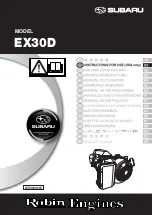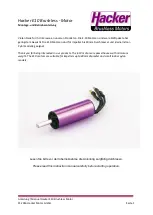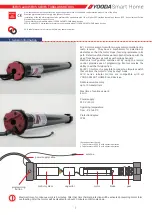
2
JP
US
GB
DE
FR
NL
ES
IT
PT
GR
NO
SE
FI
DK
RU
CN
AR
: EXHAUST PRECAUTIONS
■
Never inhale exhaust gasses.
They contain carbon monoxide, a colorless, odorless and extremely dangerous gas
which can cause unconsciousness or death.
■
Never operate the engine indoors or in a poorly ventilated area, such as tunnel, cave,
etc.
■
Exercise extreme care when operating the engine near people or animals.
■
Keep the exhaust pipe free of foreign objects.
: REFUELING PRECAUTIONS
■
Gasoline is extremely flammable and its vapors can explode if ignited.
■
Do not refuel indoors or in a poorly ventilated area.
■
Be sure to stop the engine prior to refueling.
■
Do not remove fuel tank cap nor fill fuel tank while engine is hot or running.
Allow engine to cool at least 2 minutes before refueling.
■
Do not overfill the fuel tank.
■
If fuel is spilt, wipe it away carefully and wait until the fuel has dried before starting the
engine.
■
After refueling, make sure that the fuel cap is secured to prevent spillage.
: FIRE PREVENTION
■
Do not operate the engine while smoking or near an open flame.
■
Do not use around dry brush, twigs, cloth rags, or other flammable materials.
■
Keep cooling air intake (recoil starter area) and muffler side of the engine at least
1 meter (3 feet) away from buildings, obstructions and other burnable objects.
■
Keep the engine away from flammables and other hazardous materials (trash, rags,
lubricants, explosives).
: OTHER SAFETY PRECAUTIONS
■
Place the protective covers over the rotating parts.
If rotating parts such as the drive shaft, pulley, belt, etc. are left exposed, they are
potentially hazardous. To prevent injury, equip them with protective covers or shrouds.
■
Be careful of hot parts.
The muffler and other engine parts become very hot while the engine is running or
just after it has stopped. Operate the engine in a safe area and keep children away
from the running engine.
1. SAFETY PRECAUTIONS
WARNING
Please make sure you review each precaution carefully.
Pay special attention to statement preceded by the following words.
WARNING
WARNING
WARNING
WARNING
CAUTION
“WARNING” indicates a strong possibility of severe personal injury or loss of life if
instructions are not followed.
“CAUTION” indicates a possibility of personal injury or equipment damage if instructions
are not followed.



































